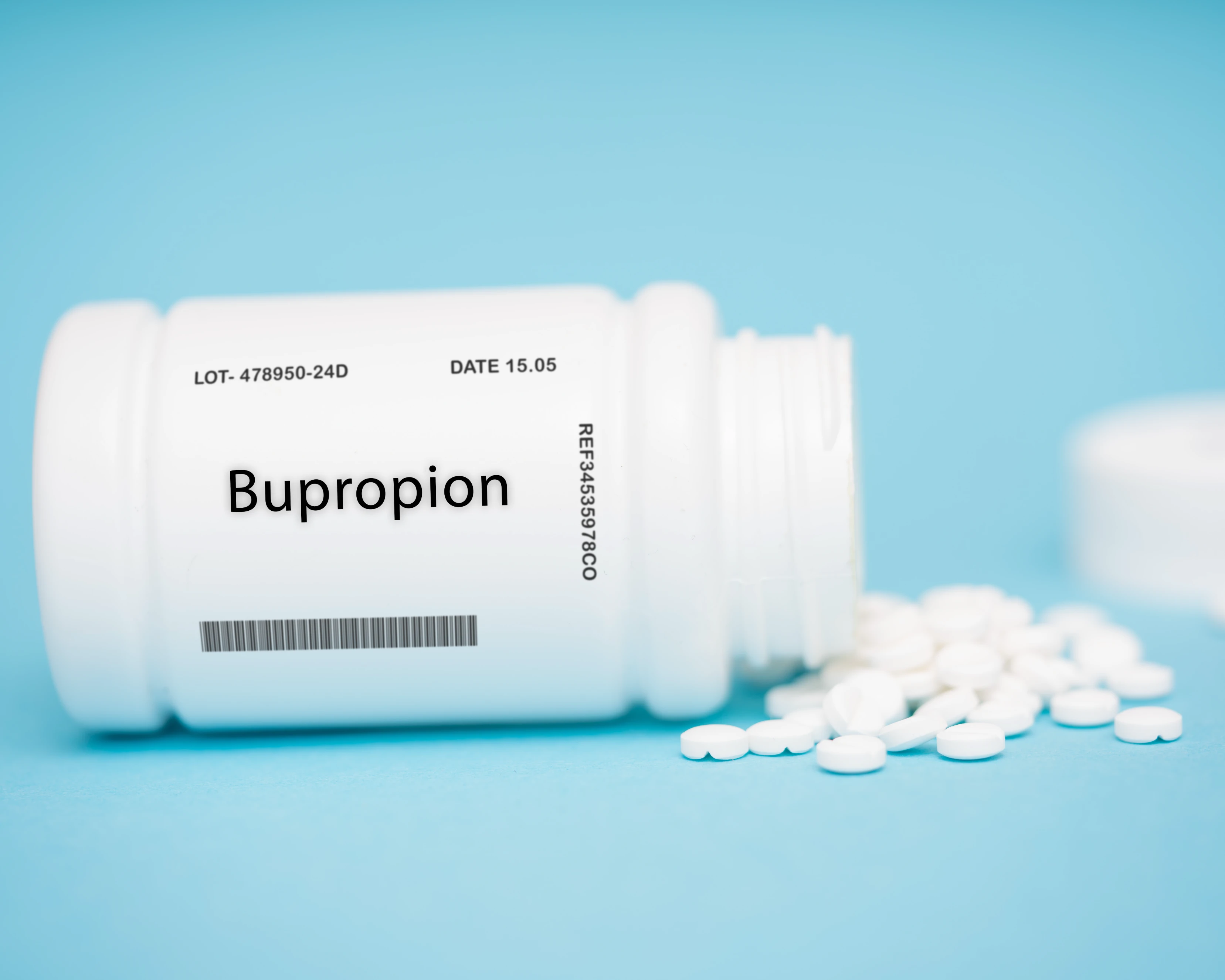The medications listed on this website are provided for informational purposes only.
Their inclusion does not guarantee they will be prescribed to any individual, as treatment decisions are ultimately at the discretion of healthcare providers.
Read moreIn addition to therapy treatment plans, we offer a specialized medication management program. Our comprehensive range of treatment options is thoughtfully designed to provide a holistic solution for managing ADHD effectively and empowering individuals to thrive.
Wellbutrin (bupropion) is not FDA-approved for ADHD, though it may be prescribed off-label in some cases. Antidepressants like Wellbutrin can increase the risk of suicidal thoughts or behaviors in children, adolescents, and young adults, so careful monitoring is important. It is not approved for pediatric use. For more info see the FDA drug label and always consult with a doctor who can best understand whether Wellbutrin is right for you.
Begin Your Personalized ADHD Care Today!

Get your ADHD Prescription Online Today
What is Wellbutrin (Bupropion)?
Attention-deficit/hyperactivity disorder (ADHD) is a condition that affects children in the United States. But it also affects many adults in the United States. You can find out more about ADHD in the NIMH ADHD treatment overview.
Stimulants are often the first choice for managing ADHD, but there are other non-stimulant medications too, and one of them is Wellbutrin. Wellbutrin is classified as an antidepressant, but unlike traditional antidepressants, Wellbutrin doesn't interact with serotonin. Its mechanism of action is what sets it apart from the other antidepressants. It is in the class of drugs called norepinephrine-dopamine reuptake inhibitors (NDRIs). Wellbutrin is FDA-approved for depression, seasonal affective disorder (SAD), and to help people stop smoking cigarettes.
It is also often used as a non-stimulant treatment for ADHD symptoms, but prescribed off-label. Wellbutrin is not a controlled substance. It's important to note that ADHD Advisor works with adults aged 18 and older, offering prescriptions, off-label, for ADHD if deemed necessary by the medical professional. Let's take a closer look at how Wellbutrin, an ADHD medication, works and learn more about this non-stimulant choice for ADHD management.
How Wellbutrin Works
So how does Wellbutrin work? Wellbutrin, or bupropion, is a norepinephrine-dopamine reuptake inhibitor (NDR). It blocks the reabsorption of norepinephrine and dopamine, which helps to increase the levels of these neurotransmitters in the brain. Dopamine and norepinephrine can help to regulate mood, concentration, and focus. Stimulant drugs also affect these two neurotransmitters, but Wellbutrin works more slowly and has a weaker effect than stimulants.
Because of Wellbutrin's effects on dopamine and norepinephrine, it has become an off-label medication for ADHD. Off-label simply means that the FDA does not currently approve it for the specific condition, but studies have shown its potential benefits for ADHD symptoms. Medical professionals may prescribe it, especially when stimulants are not suitable. Wellbutrin can also be added with a stimulant in cases where individuals have both depression and ADHD, or if the stimulant is not significantly reducing symptoms on its own.
Who Can Take Wellbutrin
Wellbutrin, or bupropion, is FDA-approved for adults with depression, seasonal affective disorder (SAD), or nicotine dependence. Bupropion for ADHD is prescribed off-label, especially in cases where there is a contraindication with stimulants or if there is underlying, co-existing depression.
Contraindications
Wellbutrin should not be used if you have any of the following conditions:
- Known allergy to any of the ingredients in Wellbutrin
- Seizure disorder
- Certain eating disorders
- Kidney or liver disease
You should also not take Wellbutrin if you are:
- On an MAOI
- On another bupropion medication
- Discontinuing taking a benzodiazepine or heavy alcohol use
- On any antiseizure medication
- On Ritonavir
- On Aripiprazole (Abilify)
- On Tramadol
It's important to note that ADHD Advisor offers Wellbutrin for ADHD in adults 18 years of age and older.
Dosages and Administration
Wellbutrin is FDA-approved for depression and SAD. Let's take a look at the dosing information for both Wellbutrin SR and Wellbutrin XL.
Wellbutrin SR, which stands for "sustained release," lasts about 12 hours. The usual dose for Wellbutrin SR starts at 150 milligrams once a day. Gradually, your doctor may increase to 150 milligrams twice a day for a total of 300 milligrams per day.
Wellbutrin XL, meaning "extended-release," offers a full 24-hour dose and typically starts at 150 milligrams once a day. Eventually, it may be increased to 300 milligrams once a day.
Off-label dosages for ADHD often mirror depression dosing. However, it will ultimately be up to your clinician to determine the dose and form you will begin with. It's a good idea to take Wellbutrin in the morning to reduce the risk of insomnia. Remember that only a licensed clinician can determine safe dosing.
Dosages can vary for each person, so follow your healthcare professional's prescription.
Side Effects and Risks
Let's go over some of the Wellbutrin side effects and possible risks.
Side Effects
As with any medication that you take, there are some potential side effects to consider. Some possible common side effects can include: (MedlinePlus: bupropion)
- Insomnia
- Dry mouth
- Nausea
- Anxiety
- Constipation
- Headache
- Dizziness
- Frequent urination
- Loss of appetite
More serious side effects may include:
- Seizures (dose-related)
- Mania
- Hypertension
- Suicidal thoughts or behaviors
- Allergic reactions
- Glaucoma
- Delusions, hallucinations, and paranoia
You can learn more about potential side effects at DailyMed: bupropion. It's essential that you are aware of any potential side effects from taking this medication and that you discuss them promptly with your healthcare provider. If you happen to experience any adverse side effects, please report them to the FDA's MedWatch reporting program.
Risks
Wellbutrin has an FDA antidepressant suicidality warning. Wellbutrin has an FDA-issued boxed warning due to the risk of suicidal thoughts and behaviors in children, adolescents, and young adults. Any patients taking this medication with depressive-related symptoms must be monitored for any suicidal thoughts or worsening symptoms. If noted, then the doctor should stop this medication. Patients with severe mood disorders and schizophrenia are also at a higher risk of developing suicidal tendencies.
Unlike stimulants, Wellbutrin is not addictive and is not a controlled substance, according to the DEA controlled substance schedules. This means that you can take this medication, under the guidance of a doctor, without the risk of developing a substance use disorder (SUD) or misuse.
Wellbutrin vs. Other ADHD Medications
Let's go over how Wellbutrin ADHD medication compares with other ADHD medications.
Wellbutrin vs Stimulants (Adderall, Concerta)
Wellbutrin and stimulants like Adderall affect the same neurotransmitters in the brain—dopamine and norepinephrine—by helping to balance them, but they do so in different ways. Wellbutrin is an NDRI that stops the reabsorption of these two chemicals.
Stimulants cause the brain to release more dopamine and norepinephrine. Wellbutrin has a weaker effect than stimulants. Wellbutrin also doesn't have the abuse potential that stimulants do and is not a controlled substance.
Wellbutrin vs Atomoxetine (Strattera)
Both Wellbutrin and atomoxetine, or Strattera, are non-stimulant options used to manage symptoms of ADHD. Strattera is a selective norepinephrine reuptake inhibitor (SNRI). It works by increasing the levels of the neurotransmitter norepinephrine in the brain. While both affect the norepinephrine in the brain, which helps to regulate attention and focus issues, Wellbutrin uses a different mechanism of action. Wellbutrin may also improve mood more significantly than Strattera.
Wellbutrin vs Viloxazine, Clonidine, and Guanfacine
Wellbutrin, a non-stimulant, is an NDRI, whereas clonidine and guanfacine are alpha 2 agonists, and viloxazine is an SNRI. All four of these medications are non-stimulant options for ADHD treatment, but each is in a different class of drugs, and Wellbutrin is in a distinct class of its own.
Clonidine and guanfacine are alpha-2 agonists that stimulate brain receptors to help with inattention and impulsivity. Viloxazine is an SNRI. It blocks the reabsorption of norepinephrine, therefore increasing the levels of this neurotransmitter in the brain, improving inattention and impulsivity. Wellbutrin may also help impulsivity and inattention, but in a different way.
ADHD Care with ADHD Advisor: Nationwide Non-Stimulant Access
ADHD can be managed successfully with proper treatment. Therapy, stimulant, and non-stimulant medication options can help to reduce symptoms of ADHD, according to the CDC ADHD treatment guidance.
A potential non-stimulant choice for ADHD is Wellbutrin. ADHD Advisor can help you obtain a Wellbutrin prescription online when you work with our healthcare professionals. We can prescribe Wellbutrin, off-label, for adults 18 and older with ADHD. We offer nationwide non-stimulant care, including Wellbutrin.
We can provide stimulant options, but only in select states. So, for example, online Adderall in Texas may be an option if deemed necessary. Similarly, your online ADHD doctor in Florida could prescribe a stimulant medication if they think it's best for your treatment plan.
With ADHD Advisor, you can receive your ADHD medication online. ADHD Advisor also assists with prescription fulfillment by sending your Wellbutrin or other non-stimulant medications directly to your chosen pharmacy each month.
We do not bill insurance; however, we will provide you with an itemized superbill that you can give to your insurance company for potential reimbursement. Now, let's look at how to get diagnosed with ADHD online with ADHD Advisor.
Step-by-Step Process
Let's learn how to get tested for ADHD online by utilizing our simple step-by-step process.
- First, you will take our online intake, and we will collect your health history.
- Next, you will schedule your telehealth ADHD evaluation with one of our healthcare professionals. During this consultation, they will go over your assessment.
- You will then receive your clinician-determined treatment plan. This plan will include therapy, non-stimulant medication, and stimulant medication if appropriate, and in specific states where we prescribe stimulants.
- Wellbutrin is available nationwide as a non-stimulant option for adults aged 18 and older, if chosen by your healthcare professional for treatment.
- Lastly, we provide you with follow-up appointments for monitoring your mood and ADHD symptoms. Doses can be adjusted if necessary during follow-ups.
Access, Cost & Insurance
The cost of Wellbutrin varies depending on the dosage, insurance, and the pharmacy you use. If you are prescribed Wellbutrin, it is widely available in the United States. A generic option, bupropion, is also available. The generic option is significantly cheaper than the brand name. Without insurance, the brand-name version of Wellbutrin is estimated to cost between $500 and $3,000 per month. Generic options are between $7 and $19 a month. However, depending on insurance, these costs can be lower.
It's important to mention that ADHD Advisor does not bill insurance. We provide a superbill that you can submit to your insurance company for potential reimbursement.
FAQs
Is Wellbutrin FDA-approved for ADHD?
No, it is currently not FDA-approved for ADHD. But it is prescribed off-label as a non-stimulant choice for ADHD.
Can ADHD Advisor prescribe Wellbutrin?
Yes, if a healthcare professional determines that Wellbutrin is a good choice for managing your ADHD symptoms, we can prescribe this non-stimulant medicine nationwide for all adults aged 18 and older.
Is Wellbutrin addictive?
No, Wellbutrin is not a controlled substance, so it is not considered addictive. It is crucial to take medication exactly as prescribed by your doctor, as misuse can lead to unwanted problems.
How does Wellbutrin compare to stimulants?
Wellbutrin works on the same neurotransmitters, norepinephrine and dopamine, that stimulants do, but differently. Wellbutrin is considered less potent than stimulants, but it is a useful option if stimulants are well tolerated.
What are the main risks?
The main risks associated with Wellbutrin are insomnia, seizures, and mood changes. It's important to let your doctor know if any of these side effects occur.










